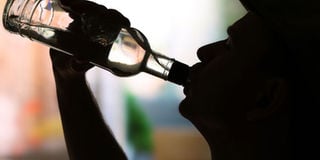Prime
A cold one for confidence

What is it about alcohol that Causes the mood to change
What you need to know:
In most cases when people drink alcohol, their mood changes to very lively and talkative. While a few become quiet or remain in their usual disposition, majority get rowdy. Lydia Ainomugisha explores what it is about alcohol that changes people’s mood, and the long-term effects.
On an ordinary day, Ivan, a law student is a perfect description of a loner. Most times he is not just composed but in solitude. He also hardly speaks unless compelled to.
But after taking alcohol, Ivan seems to be on cloud nine. He is often talkative, social and surprisingly loud.
He also confesses to feeling sexually excited when drunk. He says the reason he prefers to drink with close friends is to avoid making a silly mistake he will regret later, after he sobers up.
Asked why then he wouldn’t just quit drinking all together since alcohol seems to bring out a side of himself that has to be treated with caution, he claims that when in a drunken state, he becomes more confident and outgoing.
But Ivan is just one of the many people who derive their confidence from alcohol.
For George, a manager at a petrol station in Kampala, a few sips of a cold one are just enough to make him tipsy besides being synonymous with his self-esteem. Without one, the other vanishes into thin air. He tells of a time his girlfriend showed up at his workplace and he couldn’t face her because he was sober.
“I had to take a 15-minute break to find alcohol before I could speak to her,” he says.
Such stories are many and varying. Some people get excited, while others get depressed. For others, the alcohol takes away any sense of inhibition they would normally have when sober.
Suddenly, the man who would never confront a person who is twice his size picks a fight or the woman who never flirts with a stranger does so without batting an eyelash, unless it is planned of course. So what is it about alcohol that causes these changes in people’s moods and attitudes?
The negative effects
Dr Sheila Ndyanabangi, the principal medical officer in charge of mental health and control of substance abuse in the Ministry of Health, defines alcohol as a psycho- active drug which when taken in small quantities causes excitement but in large amounts leads to depression.
“There are few people whom it affects in an abnormal way so that they are excited when they take it in large amounts. In most cases when people take excess they lose complete touch with reality and may not remember what happened when they were drunk.
The effects are even worse when one becomes an addict. Dr Ndyanabangi says when taken for a long time, it affects the brain so much so that the brain keeps demanding for more so such people cannot do anything without taking alcohol.
“For such people, they normally take one before work because their body depends on alcohol. If they miss taking say in trying to quit alcohol, they will break down,” she explains.
After a 12-year experience of working at Butabika hospital in the mental illness alcohol and drug abuse department, she says some people have a genetic predisposition to getting addicted so before you start taking alcohol you should know your family history lest you fall a victim of alcohol addiction.
What is it about alcohol that Causes the mood to change
Dr Vincent Karuhanga of Friends Polyclinic says alcohol contains an active ingredient called ethanol, which is responsible for the mood changes.
He says: “When taken, alcohol goes into the liver, spreads to other parts of the body, including the brain. It changes a person’s mood by affecting two parts of the brain.”
He says these are the excitory and inhibitory parts of the brain.
“Because alcohol is a depressant, it first depresses the inhibitory part hence causing excitement. With time, it affects the excitory part hence causing depression. When a person keeps drinking, then they can go into sleep,” he explains.
This effect is even faster among women as Dr Karuhanga says women have little alcohol dehydration because they have less fat and hence easily get drunk.
Also, because inhibition is suppressed, this is why some people may commit outrageous crimes, which shock and shame them when the alcohol wears off.
Timothy Shay Arthur, author of Grappling with the Monster The Curse and the Cure of Strong Drink, states in one of the chapters that: “From observations of my own, that there is some analogy between our physical and psychical natures; for, as the physical part of us, when its power is at a low ebb, becomes susceptible of morbid influences which, in full vigour, would pass over it without effect.
So when the psychical (synonymous with the moral ) part of the brain has its healthy function disturbed and deranged by the introduction of a morbid poison like alcohol, the individual so circumstanced sinks in depravity, and “becomes the helpless subject of the forces of evil, “which are powerless against a nature free from the morbid influences of alcohol.”
This explains why some people will say things like, “I don’t know what came over me”, when asked to explain were they got the courage to do something they would never do.
The right amount to take
Dr sarah Ndyanabangi recommends the following amounts of alcohol:
For men: three 300ml bottles of a drink with an alcohol content of at least 4 per cent. they should also keep away from alcohol for at least two days.
For women: two bottles provided they are not pregnant or breastfeeding




